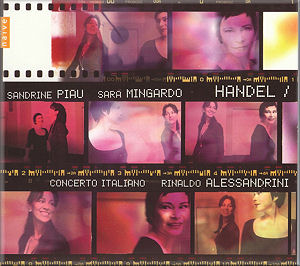 |
 |
|


alternatively
CD: AmazonUK
AmazonUS
|
George Frideric
HANDEL (1685-1759)
Poro, Re delle Indie:
Overture [3:21]
‘Caro! Dolce! Amico amplesso’ [2:47]
Orlando:
Recitative, Act III, scene 8 [0:38]
‘Finchè prendi ancora il sangue’ [3:07]
Radamisto:
Recitative, Act II, scene 13 [0:42]
‘Se teco vive il cor’ [3:16]
Flavio, Re dei Longobardi:
Recitative, Act II, scene 11 [0:42]
‘Mà chi punir desio’ [6:58]
Tamerlano:
Recitative, Act II, scene 8 [0:26]
‘Più di una tigre altero’ [4:08]
‘Vivo in te’ [7:51]
Ezio:
Recitative, Act III scene 12 [0:53]
‘Ah! Non son io che parlo’ [7:13]
Rinaldo:
Recitative, Act I, scene 6 [1:07]
‘Scherzano sul tuo volto’ [3:26]
Alessandro:
Overture [5:37]
Recitative, Act I, scene 6 [0:15]
‘No, più soffrir non voglio’ [3:43]
Recitative, Act I, scene 9 [0:23]
‘Da un breve riposo’ [4:47]
Amadigi di Gaula:
Recitative, Act II, scene 5 [0:32]
‘Pena tiranna’ [6:00]
Ottone, Re di Germania:
Recitative, Act III, scene 9 [0:31]
‘A’ teneri affetti’ [3:55]
 Sandrine
Piau (soprano) Sandrine
Piau (soprano)
Sara Mingardo (contralto)
Concerto Italiano/Rinaldo Alessandrini
rec. Instituto Pontificale di Musica Sacra, Rome, 2008. DDD
 NAÏVE OP 30483 [72:28]
NAÏVE OP 30483 [72:28]  |
|
|
Another Handel opera disc during this anniversary year (2009)
- but one with a difference. The arias, duets, recitatives
and
overtures in this recording are not grouped according to a set
theme or singing style: heroic tenors, rival queens or famous
castrati. Instead, if the sleeve-notes are to be believed,
soprano
Sandrine Piau, contralto Sara Mingardo and conductor Rinaldo
Alessandrini set out simply to enjoy themselves by performing
favourite works
from across Handel’s operatic output. Their only rules were
to omit the very famous numbers - ‘Cara sposa’ from Rinaldo, for example, is not included - maintain a sense
of mood contrast, and to include opening recitatives as a means
of placing the characters within the dramatic context of each
opera.
As an exercise in high quality musical enjoyment, the three performers
largely succeed - both for themselves and for the listener. The
most noticeable factor is the contrast between the two voices.
Mingardo possesses a deep, rounded contralto voice which is well
suited to some of the roles Handel originally wrote for castrati.
Meanwhile, Piau’s bright, crystal-clear soprano is perfect for Handel’s heroines. Together, they reveal the freshness and complexities of Handel’s
vocal writing, without some of the muddiness that often mars
soprano and mezzo couplings.
The obvious highlights are Piau’s and Mingardo’s
duets from Poro, Orlando, Radamisto, Tamerlano,
Rinaldo and Ottone. Both singers also get the chance
to shine in solo arias. Piau gets the vocal pearls, for example
in ‘No, più soffrir non volgio’ from Alessandro
(track 18). But Mingardo possibly has the edge in characterisation,
moving from wounded indignation as Andronico in Tamerlano (track
10), to the Macedonian king’s smug self-satisfaction
in Alessandro (track 20).
There is fine orchestral support throughout from Concerto Italiano
under Alessandrini. Lamenting recorders add to the pathos of
Asteria
and Andronico’s duet from Tamerlano (track 11),
while oboe and bassoon accompaniment, plus cutting strings, add
real
depth to Dardano’s aria from Amadigi (track 22).
Only in two overtures - to Poro and Alessandro -
does the orchestra get to shine alone. In the more substantial
Alessandro overture (track 16) the slow opening section
is suitably stately and martial, while the lengthy allegro is
full of lively flourishes - particularly from the woodwind. Interesting
sleeve-notes and full texts and translations add to a very enjoyable
and desirable package.
John-Pierre Joyce
|
|












